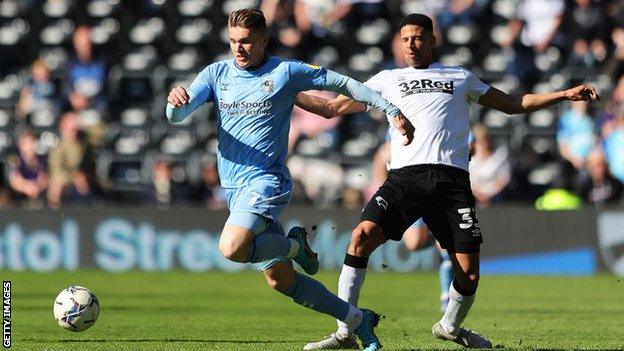'Flawed' EFL gambling evidence should be ignored - MP
- Published

Coventry City and Derby County are two of 15 Championship teams who have betting partners
"Flawed" evidence submitted to the government's gambling review by the English Football League should be ignored, according to an MP who chairs a parliamentary group for gambling reform.
The EFL, which is sponsored by Sky Bet and whose clubs receive £40m a year from gambling companies, commissioned research, seen by the BBC, which said there was "no evidence" that sponsorship influences participation in betting.
It also said that gambling participation in sport "had remained flat at about 9% of the population between 2010 and 2018" and over the same period "the rate of problem gambling in sports had halved from 6% to 3%".
But a critical assessment of those findings by a research company, Vita, said the results were "flawed" and "misleading" and asked if the analysis was "undertaken to draw a pre-determined conclusion".
The EFL and research author Professor Ian McHale of the University of Liverpool stood by the findings when the critique was presented to them by BBC Sport.
Labour MP and chair of the All Party Group for Gambling Related Harm Carolyn Harris said gambling minister Chris Philp should "choose to ignore" the research in the gambling review, for which a white paper is due to be published within weeks.
Vita's critique, which was commissioned by campaign group Clean Up Gambling, said the research was "faulty" based on using two different types of survey to assess gambling participation and problem gambling rates.
One of those surveys, conducted by the NHS and which runs from 2012 to 2018, cautioned against combining its results from a previous version of the survey because different methods were used to collect data.
The EFL's research also said there was "no evidence that sponsorship of clubs or leagues by betting operators influences participation in betting, or being a Skybet customer".
But the influence to gamble or not was based only on fans whose team had a gambling sponsor on their shirts and whether their team played in the Sky Bet-sponsored EFL, disregarding any other sponsorship or advertising in football as a whole.
It also concluded that "not being a fan of football decreases the probability of being a bettor, and of being a Skybet customer".
Vita said: "The assumption that support for a team determines the extent of [sponsorship] exposure is deeply flawed, given the evidence of how much gambling promotion is all over football content of all kinds."
The EFL research is part of 16,000 pieces of evidence that have been submitted to the gambling act review, with Philp saying that any changes to the law will be based on an "evidence-led" approach.
Harris told The Sports Desk podcast: "A decent thing would be to withdraw [the EFL] evidence, but they're not going to do that. So you need to take it with a massive pinch of salt which I suspect [the government] do.
"[The minister] can ignore it, he can choose to ignore it or discard it. And I would like to think that he would, but we know he's overwhelmed with evidence at the moment. I don't think the gambling minister is entirely hoodwinked. I think he sees a lot of the content for his white paper as being flawed.
"The minister has spent a lot of time looking at the background. I know he's been to the gambling companies, I know he's met with the trade body, but he's also met with families of people who have committed suicide.
"I think he absorbs things and he is capable of disseminating truth from fiction. Hopefully the white paper will reflect that."
'No causal link between sponsorship and problem gambling'
Football's relationship with gambling and betting sponsors has come under huge scrutiny in advance of expected reform.
Nine Premier League teams have gambling firms as shirt sponsors, with all 20 top-flight teams having at least one betting partner. In the Championship, there are six teams with shirt sponsors and 15 sides with betting partners.
Campaigners have called for a complete ban on betting advertising and sponsorship in football, but the EFL says that would leave a £40m hole in its clubs finances each year and could force some to "go under" after a financially difficult time during the Covid-19 pandemic.
The EFL also says it wants all of its gambling partner relationships to be socially responsible.
The Premier League has submitted evidence to the gambling review and says it supports a self-regulatory approach to sponsorship rather than legislation or a ban.
And it shares the view of the Betting and Gaming Council, which says: "The government has previously stated research did not establish a causal link between exposure to advertising and the development of problem gambling."
Gambling industry sources have suggested that the intention of sponsorship and advertising was to gain a bigger share of existing customer base rather than entice new customers.
But recent research by the University of Glasgow showed that in one Premier League match shown on TV, over 700 betting logos were visible, while separate research by Goldsmith's University showed that gambling logos or branding were visible on screen for between 71% and 89% of Match of the Day's running time.
A Betting and Gaming Council spokesperson added: "Betting advertising and sponsorship must comply with strict guidelines and safer gambling messaging is regularly and prominently displayed.
"However, we strongly support the gambling review as a further opportunity to raise standards and promote safer gambling."